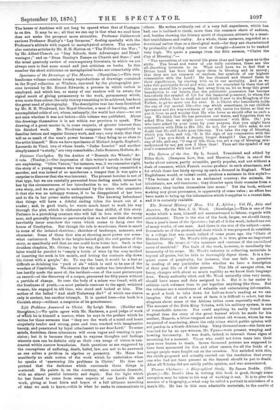Life Problems Answered in Christ. By Leigh Mann. (Hodder and
Stoughton.)—We quite agree with Mr. Maclaren, a good judge of work of which he is himself a master, when he says in the preface which he writes for these sermons that " they are the work of a mind and heart -singularly tender and strong, pure and true, touched with imaginative beauty, and penetrated by loyal attachment to our dear Lord." To some minds, doubtless, these utterances will seem vague and wanting in pre- cision; bat it is because they seek to express thoughts and feelings wherein men can be definite only as their own range of vision is con- tracted within narrow boundaries. Such questions as are suggested by the conceptions of suffering, death, belief, law, are not to be answered as one solves a problem in algebra or geometry. Mr. Mann has manifestly no =oh notion of the work which he undertakes when he speaks of 'answering life problems in Christ.' He does not pretend that the darkness which surrounds these things is scattered. He paints it, on the contrary, when occasion demands, with an almost painful intensity and depth. But the light which the has found to come from some aspects of our Lord's life and work, giving at least hints and hopes of a full ultimate unveiling of what we seek to know, this is what he seeks to communicate to
others. He writes evidently out of a very full experience, which has had, one is inclined to think, more than the common share of sadness, and, besides showing the literary merit of eloquence, attracts by a mani- fest truthfulness and reality. As a whole, these sermons, regarded as a devotional rather than as a theological work—for they are characterized by profundity of feeling rather than of thought—deserve to be ranked very high. We quote a passage from the fifth sermon, "Christ the Cup of Blessing :"— " The necessities of our mortal life press close and hard upon ns in the strife. The bread and water of our daily existence, these are the all-absorbing interests to us. What need have we to feel that a Divine hand has been laid upon them in blessing and in mercy ; that they aro not common or unclean, but symbols of our highest communion with the Lord ? He has cleansed and blessed them in their significance, by sharing with us in our mortality. And as we take this perishable broad and wino, and are reminded by them that all this our mortal life is passing fast away from us, let us wrap this great benediction to our hearts, that the perishable possession has become henceforth the symbol of life for the immortal possessor, to whom the promise abides, that ho shall eat and drink it new in the Kingdom of the Father, to go no more out for ever. It is Christ who henceforth holds the cup of our mortal life—the cup which sometimes, in our childish ignorance and the waywardness of our will, tastes too bitter, so that we put it from us and wonder that He who loves as should offer us such a cup. We think that He has mistaken our wants, and forgotten that we asked Him that wo might have ' communion ' with Him. Oh! you who have asked by your trust, by your prayers, that you might have communion with Him in His life, do not, for your life's sake, do not doubt that Ho still holds your life-cup. You take the cup of blessing, which you bless, and cry, 'It is the sign of my communion with the Lord' Can you drink a deeper, longer draught Can you take the cup of life, and say, 0 cup of life, thou, too, art a cup of blessing,
mis-
understood by me, yet now I bless thee! Thou art the symbol of my soul's communion with her Lord 1"






























 Previous page
Previous page